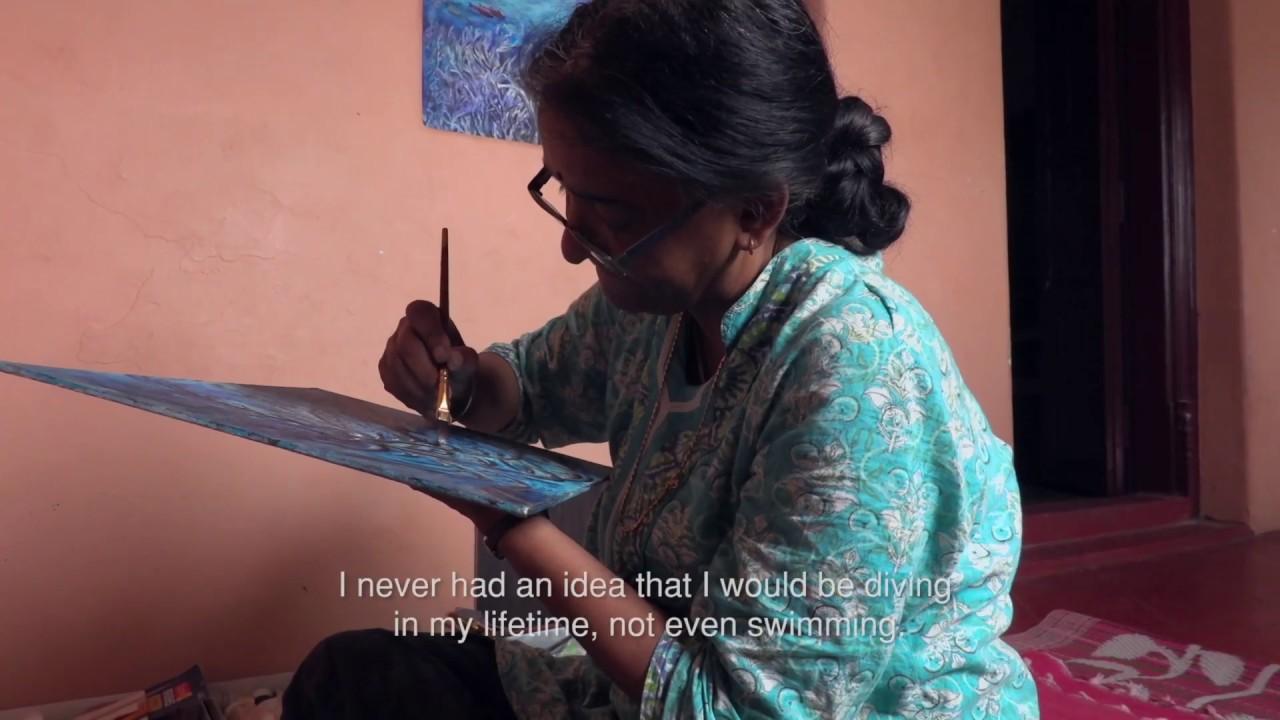Documentaries are often directed in retrospect and the hope is to find a coherent story
through the documentation as one goes along the way. This documentary follows Uma Mani, a
painter, and indeed manages to find a consistent narrative. Enamoured by the beauty of coral reefs of Maldives (where she lived temporarily), she
learns to swim and scuba dive at the age of 49. However, when she seeks the same experience in India,
she is met with a grim reality.
Mani reaches the Gulf of Mannar only to be introduced to bleached, lifeless corals. What starts as an enthusiastic hobby turns into a more passionate attempt at understanding and safeguarding ‘the rainforests of the ocean’.
The film falters a little due to its form more than content. It peaks at the start which is often detrimental for any film. What the narrative promises to be at the beginning is almost a spiritual experience through the underwater world, of human exploration, and is a heartfelt plea for conservation of nature. As it progresses, it seems to lose some of this charm, but manages to recover itself in time. This is achieved by its attempt to go beyond simply stating the problem. Instead it also strives to find solutions and offer them to the viewer.
The cinematography is a mix bag. There is an attempt to capture the underwater sequences more beautifully than those above it. The allure of a documentary of this kind comes broadly from two things. Either delving into the mind of an interesting subject (Mani fits the bill, but comes across as not being explored to her full potential); or going all out with the events happening around them. This film, however, attempts to straddle between the two.
Despite it all, Coral Woman has several moments to cherish and enough substance to be informative as well as thought-provoking. In a brilliant sequence, a conservationist shows Mani a partially submerged island off the coast of Tamil Nadu. The image of a half-submerged tower built by the British centuries ago makes for a haunting image. One could feel themselves sinking under the ever rising water themselves. After all, nature is bigger than our history, our society and our inconsequential towers.
Written by Nimish K Sharma
Mani reaches the Gulf of Mannar only to be introduced to bleached, lifeless corals. What starts as an enthusiastic hobby turns into a more passionate attempt at understanding and safeguarding ‘the rainforests of the ocean’.
Ninety percent of the coral reefs in the world are expected to be wiped out by 2050 due to global warming, coral mining and water pollution. The intricacies of the situation are explored from the eyes of a person who is already deeply invested in these beautiful, ancient life forms.
The film works as a commentary on the attempts to conserve the world we live in. A large part of it is set in a place where indiscriminate and irresponsible discharge of chemicals from factories is leading to an alarmingly high number of cancer cases. The protests turn violent and many people die. Mani witnesses all this, and wonders what would happen to the fishes and corals. Who would raise a voice for the protection of a being incapable of speaking out for itself? While humans can fight with their words and swords, the quiet corals, on the other hand, cannot. In a way, thus, they come to represent the rest of the planet.The film falters a little due to its form more than content. It peaks at the start which is often detrimental for any film. What the narrative promises to be at the beginning is almost a spiritual experience through the underwater world, of human exploration, and is a heartfelt plea for conservation of nature. As it progresses, it seems to lose some of this charm, but manages to recover itself in time. This is achieved by its attempt to go beyond simply stating the problem. Instead it also strives to find solutions and offer them to the viewer.
The cinematography is a mix bag. There is an attempt to capture the underwater sequences more beautifully than those above it. The allure of a documentary of this kind comes broadly from two things. Either delving into the mind of an interesting subject (Mani fits the bill, but comes across as not being explored to her full potential); or going all out with the events happening around them. This film, however, attempts to straddle between the two.
Despite it all, Coral Woman has several moments to cherish and enough substance to be informative as well as thought-provoking. In a brilliant sequence, a conservationist shows Mani a partially submerged island off the coast of Tamil Nadu. The image of a half-submerged tower built by the British centuries ago makes for a haunting image. One could feel themselves sinking under the ever rising water themselves. After all, nature is bigger than our history, our society and our inconsequential towers.
Written by Nimish K Sharma


